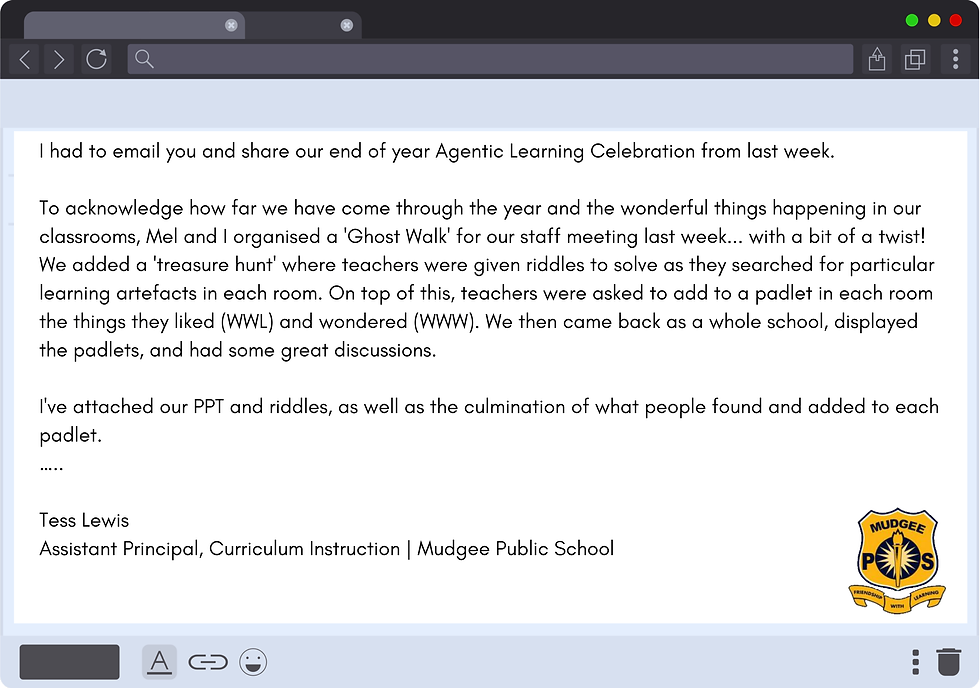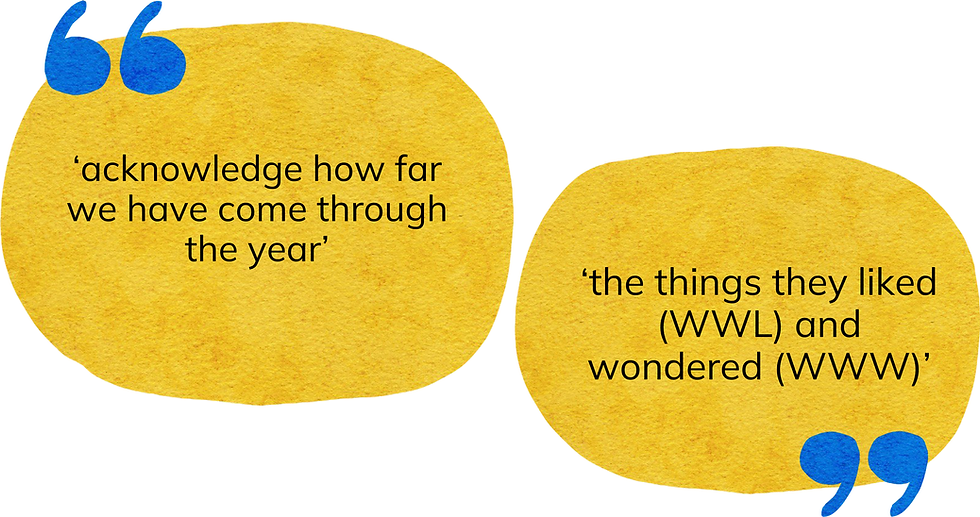To "celebrate" means to acknowledge and honour a special event, achievement, or milestone with joy, enthusiasm, or festivities. It often involves activities or expressions of appreciation, recognition, or enjoyment to mark the importance of the occasion. Celebrating can be done through parties, ceremonies, gifts, or simply by taking time to reflect and show gratitude.
In November 2024 we received the email below from Mudgee Public School, one of the schools we have the privilege of partnering with.

(We have shared screenshots of the padlet and a sample of the Treasure Hunt at the end of this PIE)
What stands out for you in this email?
Can you hear and see the joy and enthusiasm? ‘Wonderful things’ and ‘great discussions’.
Some of our favourite phrases from this email are:

They are our favourites because they capture some of the things we value most about learning; progress, persistence, inquiry, curiosity and preparedness to question. They are saying that we are not only seeking to celebrate successful outcomes but are also celebrating people during the bumps, dings, failures, growth, and progress and that through celebrating each other we all can learn.
As an educator, what do you celebrate in your professional learning life and the lives of those you learn with? Any of these?


Do a quick celebration audit. Look back at the last term or last year.
What did you celebrate about learning?
Who with?
How did you celebrate?
Who did the celebration include? Exclude?
What happened because of the celebration?
Why celebrate learning?
Celebrating has both a positive impact on the learning and the learners.
Celebrating learning:
Reinforces what and how we have learned. Celebrating can make the new learning stick and can provide a time to think about how far we have come.
Boosts motivation and resilience by helping us feel prepared to keep learning and like we can bounce back from setbacks.
Builds a growth mindset when we celebrate effort and working hard, even struggling, to improve.
Creates a positive vibe. When we celebrate together we feel part of something bigger. Celebrations can also make people feel less tense, depending on when and how the celebration occurs. We will mention the ‘Five Love Languages’ (Chapman 2010) a bit later to connect with this idea.
Encourages teamwork as we connect with people, see others succeed and support each other. Plus, seeing others succeed can inspire us too.
Not leaving celebration to chance
The word “celebration” can conjure up images of big to-dos: end-of-year parties or public displays of appreciation, but celebrations can take many forms and be many shapes and sizes. Whilst some celebrations are spontaneous, in the busyness of sites and schools celebrating what we value can get lost. How might you prioritise celebrating learning? Not surprisingly, one way is to plan or prepare in advance.
This might be as simple as consciously starting conversations with ‘What’s been going well for you?’ and truly listening with the mindset of curiosity, generosity and an open-mind, encouraging them to share all the details of what is going well.
Your celebrations might link to specific evidence gathering time points that align with your strategic plan. This could include prioritising time during a staff session to reflect on what is working based on the evidence as well as what we have learnt. A Success Protocol is one way you might do this and there are other protocols you could use.
Your celebrations might be providing opportunities for all staff to see what is happening in each other’s learning spaces. Like Mudgee Public School, Trinity Gardens School (see more here) also implemented a Ghost Walk (see Micro Move #13) to celebrate implementing school agreed practices.
Your celebrations might be nuanced to the preferred way an individual likes to be acknowledged. You may be familiar with Gary Chapman’s (2010) book, The Five Love Languages, which explores ways individuals give and receive love (care, encouragement, acknowledgement). He has identified five love languages: Gifts, Physical Touch, Quality Time, Acts of Service, and Words of Affirmation.
Knowing someone's love language can impact how we celebrate them and with them. Sometimes there will be clues. For example, those who prefer to be celebrated through quality time might value you spending time in their learning space as they engage with learners. Those who prefer to be celebrated through words of affirmation might prefer an email or a note. A quick google search will give you more information about this from the perspective of leaders and educators. We have added some links in the references below. When in doubt, the easiest thing to do is ask the person!
As you plan to celebrate learning in 2025 here are some things to keep in mind.

What constitutes a celebration?
Two thoughts here. The first is that what constitutes a celebration for one person may not be seen as a celebration for another. The second thought is that what you celebrate is what you value. Go back to your audit. What do your celebrations indicate that you value about learning?
Celebrate the Warts and All
Celebrating learning is about the journey and the destination and let’s face it; the journey is rarely bump or incident free. Celebrate what worked, what did not work, what was changed and what was ditched in the journey forwards.
Celebrate Small and Often
We can fall into the trap of celebrating when we are at the end of an initiative or long process but it’s keeping track of our wins throughout the work that reaps the benefits. According to behavioral scientist Brian Fogg (2020), celebrating small wins stimulates dopamine release in the brain, a feel-good chemical that reinforces our learning experiences and strengthens the sense of connection not only to the work but also to those we do the work with.
Be Excited by the Unexpected
Avoid the tunnel vision of looking for what success looks like based on a goal or target by also looking for the unexpected. What did educators or students learn that was not anticipated? What did you learn about those learning? What else that contributes to learning was developed or enhanced?
Celebrate you, too
Have you ever heard or used this phrase, “And I said to myself, self….”. In some memes it continues with “And I know it was me, cause I recognised my voice, and I was wearing my underwear”.
What have you accomplished personally or saw with those you learn with and from? You have played a significant role in the progress you have made this year and the progress of colleagues and learners. As you’re celebrating others, don’t be afraid to give yourself a few compliments as well—even if the only person that hears them is you. “And I said to myself, self…”
And last of all, we hope that you all have someone to share your celebrations with who will respond with joy and enthusiasm for your learning and learning experiences.
References:
Chapman, G. D. (2010). The five love languages. Walker Large Print.
Fogg, B. J. (2020). Tiny habits: + the small changes that change everything. Boston, Houghton Mifflin Harcourt.
Mudgee Public School Ghost Walk:





Five Love Languages for Teachers:


Comments